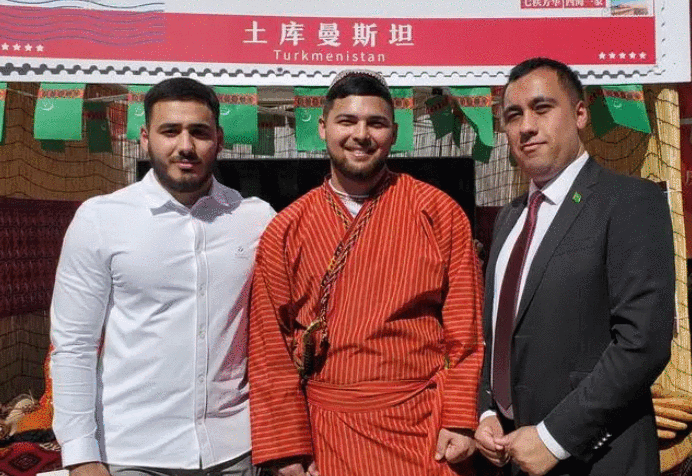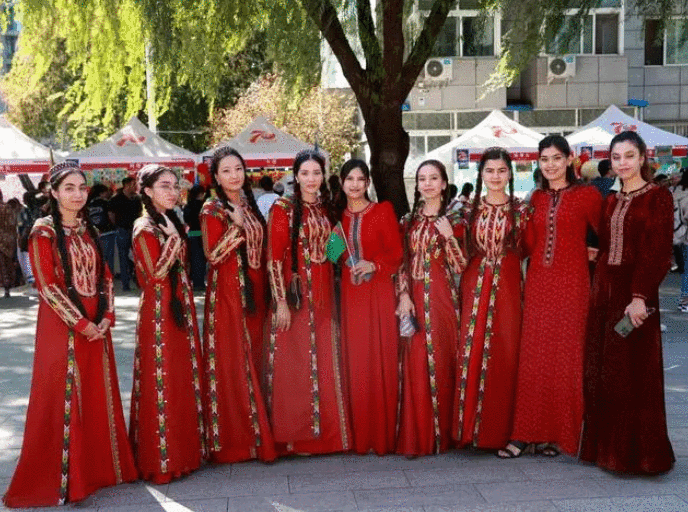At the age of 16, Ruoheman (若贺曼) came from Turkmenistan to study at the China University of Petroleum (Beijing). For 13 years, he pursued his education here from undergraduate studies all the way to earning his PhD.

In 2009, the China University of Petroleum (Beijing) collaborated with the China National Petroleum Corporation (Turkmenistan), the Ministry of Education of Turkmenistan, and other Turkmenistan gas entities to initiate an educational program for studying abroad in China.
In 2010, Ruoheman passed the exams and became one of the students cultivated through this program. “This program was particularly popular in Turkmenistan. Initially, a few hundred people applied, but now the number has exceeded 1,000 annually, making the competition very intense,” he recalled.

During his undergraduate and master’s studies, Ruoheman pursued majors in chemical engineering and enterprise management respectively. In September of this year, he graduated with a PhD in Marxist Studies in China from the China University of Petroleum and decided to continue working at the university. “In recent years, China has achieved tremendous development. Choosing Marxist Studies in China as my doctoral major was because I wanted to explore the path to China’s success in development,” he explained.
For Ruoheman, the year 2023 holds special significance for Sino-Central Asian relations—marking the inaugural China-Central Asia Summit and the tenth anniversary of the Belt and Road Initiative. “Historically, the ancient Silk Road connected Turkmenistan and China; now, the Belt and Road Initiative has made the friendship between the two countries even closer,” he remarked.
Over the past decade, more and more Central Asian youths like Ruoheman have come to China, becoming witnesses and beneficiaries of the Belt and Road Initiative.

During the recent third Belt and Road International Cooperation Summit Forum, 26-year-old Kazakhstani girl Aziza Lesken (阿齐扎) was invited to participate in bilateral activities between China and Kazakhstan. Back in the 2019 second Belt and Road International Cooperation Summit Forum, Aziza, who was then studying in China, worked as temporary staff at the Kazakh Embassy in China, handling media contacts and organizing interviews. “Having had the opportunity to participate in both forums, I have learned a lot and have greatly developed my abilities,” she said.
Aziza hails from Aktau, Kazakhstan. Influenced by her parents who worked for Chinese companies in their hometown, she had a strong interest in China since childhood. “When I was young, my dad used to travel to China for work, bringing back tea and other specialties while narrating stories about China to us,” Aziza said, nurturing her desire to study in China when she grew up.
Today, studying petroleum engineering at the China University of Petroleum (Beijing), Aziza pays special attention to the cooperation between the two countries in the energy sector. In her view, over the past decade since the inception of the Belt and Road Initiative, China and Kazakhstan have achieved tangible cooperation results.
“Not long ago, during the Belt and Road International Cooperation Summit Forum, the two countries signed a series of cooperation agreements, indicating a broad prospect for future collaboration,” Aziza remarked.
Alya Buzheva (阿利亚), a 21-year-old girl from Kyrgyzstan, has been interested in Chinese culture since childhood. Currently pursuing a master’s degree in Chinese International Education at the China University of Petroleum (Beijing), she particularly admires the Chinese proverb: “Live as long as you can and learn as long as you live,” because it reflects the attitude of continuous learning and self-improvement in Chinese culture.
In addition to her studies, Alya is involved in managing the official social media accounts of the school’s overseas platforms and has her own social media accounts. “I often share my experiences of traveling in China, hoping to let more people feel the charm of China and its culture,” she said.
Currently, more than 300 students from Central Asian countries are studying at the International Education Institute of the China University of Petroleum (Beijing). “Since the inception of the Belt and Road Initiative, more and more young people from Central Asia have become interested in China,” Ruoheman said. “We are very grateful to China for providing us with quality education and hope that more students can come to China for education and development.”
“The Belt and Road Initiative has brought together young people from different countries and cultures, providing us with the opportunity to pursue our dreams,” Alya concluded.



